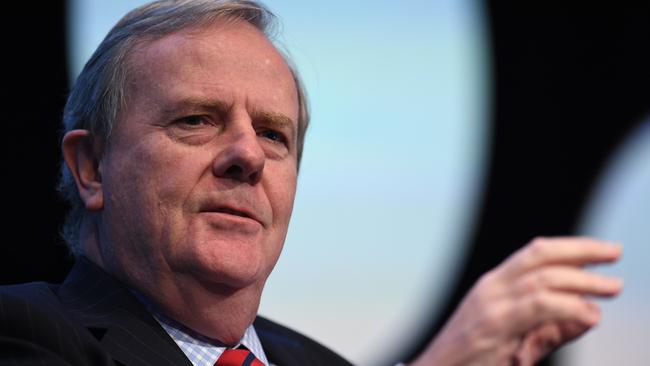Bring income tax cuts forward, slice red tape: Costello
Former treasurer Peter Costello has urged the Morrison government to bring forward personal income tax cuts and tear up regulations that stifle bank lending

Former treasurer Peter Costello has urged the Morrison government to bring forward personal income tax cuts and tear up regulations that stifle bank lending, warning against a “high-tax cheer squad” that will seek to use a looming economic slump from the coronavirus as an excuse to lift taxes permanently.
Following calls from Reserve Bank governor Philip Lowe to kickstart tax and workplace reform, Mr Costello, now chairman of the Future Fund, said the government should not alter its tax-cut timetable, which would have earnings between $45,000 and $200,000 taxed at 30 per cent by mid-2024.
The former Howard government treasurer said despite an expected surge in net public debt from about 20 per cent of GDP to 35 per cent, the government should not lift income taxes.
“I’d very strongly say they should stick to their timetable and even look at accelerating it — bringing the cuts forward,” he told The Australian.
“We have to be very careful that when we come out of this we have a competitive tax system.
“The high-tax cheer squad will use this as an opportunity to increase taxes all over the place; they will use the crisis to go after an agenda they have long wanted to pursue.”
The Nine Entertainment chairman also said red tape, in particular the responsible-lending laws, were inhibiting economic growth.
“The downturn has highlighted how much red tape we have burdened our society with, in particular financial regulation,” Mr Costello said.
Responsible-lending rules, which since 2010 have required lenders to judge whether loans are “suitable” for borrowers, were “thoroughly inappropriate to the circumstances we now find ourselves in”, he added.
In a speech on Tuesday that forecast a “staggering” 20 per cent slump in hours worked in the first half of this year and a slump in GDP of 10 per cent, Dr Lowe urged governments to use the coronavirus crisis to reform income, consumption and land taxes, and slash complexity in industrial awards.
Josh Frydenberg signalled on Wednesday that the government would consider revisiting lower company taxes for big business despite having previously ditched plans to cut the rate from 30 per cent to 25 per cent.
“There is an opportunity to build on the co-operative spirit that is now serving us so well to push forward with reforms that would move out of the shadows cast by the crisis,” Dr Lowe said.
Mr Costello said the tax system had endured “years of bracket creep” and needed to deliver “real economic growth, with high incentives to work”.
“This crisis has exposed massive red tape, built up over a long period, and I hope as we come out of this crisis we find that quite a bit of it is unnecessary,” he said.
ASIC commissioner Sean Hughes defended responsible-lending laws late last year following concerns lenders would tighten standards in the wake of the Hayne royal commission.
“We are very concerned about what in some instances has been the incorrect and inaccurate reporting in relation to the supposed effects of the responsible-lending laws,” he said in November.
The Australian Securities & Investments Commission, which oversees the responsible-lending laws, lost a case in the Federal Court last year against Westpac.
The commission alleged Westpac had not taken sufficient account of borrowers’ expenses and repayment capacity.
“They make it very difficult to make loans where banks have to individually assess everyone’s expenses,” Mr Costello said.
“The government is now saying that banks have got to lend more, when the whole point of responsible-lending laws is for them to lend less,” he said.







